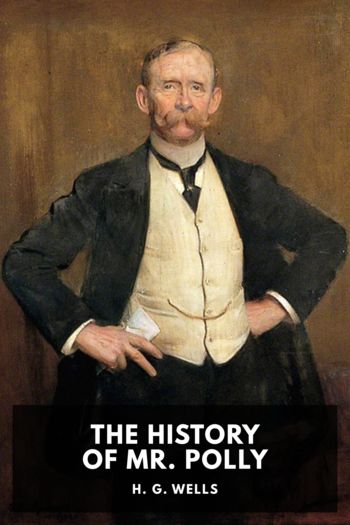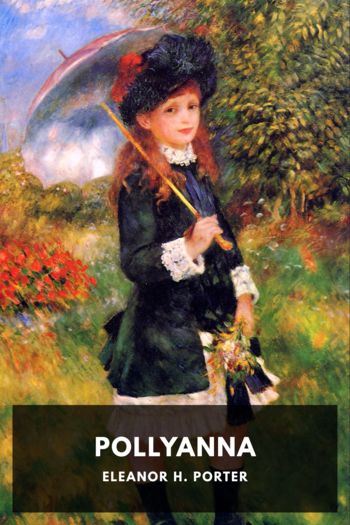Pollyanna Grows Up by Eleanor H. Porter (best ereader for epub txt) 📕

- Author: Eleanor H. Porter
Book online «Pollyanna Grows Up by Eleanor H. Porter (best ereader for epub txt) 📕». Author Eleanor H. Porter
“Then how will you manage?”
“I’m going to begin in the morning and go to every train till they come,” laughed the young man, a bit grimly. “Timothy’s going, too, with the family carriage. After all, there aren’t many trains, anyway, that they can come on, you know.”
“Hm-m, I know,” said John Pendleton. “Jim, I admire your nerve, but not your judgment. I’m glad you’re going to follow your nerve and not your judgment, however—and I wish you good luck.”
“Thank you, sir,” smiled the young man dolefully. “I need ’em—your good wishes—all right, all right, as Nancy says.”
XVII When Pollyanna CameAs the train neared Beldingsville, Pollyanna watched her aunt anxiously. All day Mrs. Chilton had been growing more and more restless, more and more gloomy; and Pollyanna was fearful of the time when the familiar home station should be reached.
As Pollyanna looked at her aunt, her heart ached. She was thinking that she would not have believed it possible that anyone could have changed and aged so greatly in six short months. Mrs. Chilton’s eyes were lusterless, her cheeks pallid and shrunken, and her forehead crossed and recrossed by fretful lines. Her mouth drooped at the corners, and her hair was combed tightly back in the unbecoming fashion that had been hers when Pollyanna first had seen her, years before. All the softness and sweetness that seemed to have come to her with her marriage had dropped from her like a cloak, leaving uppermost the old hardness and sourness that had been hers when she was Miss Polly Harrington, unloved, and unloving.
“Pollyanna!” Mrs. Chilton’s voice was incisive.
Pollyanna started guiltily. She had an uncomfortable feeling that her aunt might have read her thoughts.
“Yes, auntie.”
“Where is that black bag—the little one?”
“Right here.”
“Well, I wish you’d get out my black veil. We’re nearly there.”
“But it’s so hot and thick, auntie!”
“Pollyanna, I asked for that black veil. If you’d please learn to do what I ask without arguing about it, it would be a great deal easier for me. I want that veil. Do you suppose I’m going to give all Beldingsville a chance to see how I ‘take it’?”
“Oh, auntie, they’d never be there in that spirit,” protested Pollyanna, hurriedly rummaging in the black bag for the much-wanted veil. “Besides, there won’t be anybody there, anyway, to meet us. We didn’t tell anyone we were coming, you know.”
“Yes, I know. We didn’t tell anyone to meet us. But we instructed Mrs. Durgin to have the rooms aired and the key under the mat for today. Do you suppose Mary Durgin has kept that information to herself? Not much! Half the town knows we’re coming today, and a dozen or more will ‘happen around’ the station about train time. I know them! They want to see what Polly Harrington poor looks like. They—”
“Oh, auntie, auntie,” begged Pollyanna, with tears in her eyes.
“If I wasn’t so alone. If—the doctor were only here, and—” She stopped speaking and turned away her head. Her mouth worked convulsively. “Where is—that veil?” she choked huskily.
“Yes, dear. Here it is—right here,” comforted Pollyanna, whose only aim now, plainly, was to get the veil into her aunt’s hands with all haste. “And here we are now almost there. Oh, auntie, I do wish you’d had Old Tom or Timothy meet us!”
“And ride home in state, as if we could afford to keep such horses and carriages? And when we know we shall have to sell them tomorrow? No, I thank you, Pollyanna. I prefer to use the public carriage, under those circumstances.”
“I know, but—” The train came to a jolting, jarring stop, and only a fluttering sigh finished Pollyanna’s sentence.
As the two women stepped to the platform, Mrs. Chilton, in her black veil, looked neither to the right nor the left. Pollyanna, however, was nodding and smiling tearfully in half a dozen directions before she had taken twice as many steps. Then, suddenly, she found herself looking into a familiar, yet strangely unfamiliar face.
“Why, it isn’t—it is—Jimmy!” she beamed, reaching forth a cordial hand. “That is, I suppose I should say ‘Mr. Pendleton,’” she corrected herself with a shy smile that said plainly: “Now that you’ve grown so tall and fine!”
“I’d like to see you try it,” challenged the youth, with a very Jimmy-like tilt to his chin. He turned then to speak to Mrs. Chilton; but that lady, with her head half averted, was hurrying on a little in advance.
He turned back to Pollyanna, his eyes troubled and sympathetic.
“If you’d please come this way—both of you,” he urged hurriedly. “Timothy is here with the carriage.”
“Oh, how good of him,” cried Pollyanna, but with an anxious glance at the somber veiled figure ahead. Timidly she touched her aunt’s arm. “Auntie, dear, Timothy’s here. He’s come with the carriage. He’s over this side. And—this is Jimmy Bean, auntie. You remember Jimmy Bean!”
In her nervousness and embarrassment Pollyanna did not notice that she had given the young man the old name of his boyhood. Mrs. Chilton, however, evidently did notice it. With palpable reluctance she turned and inclined her head ever so slightly.
“Mr.—Pendleton is very kind, I am sure; but—I am sorry that he or Timothy took quite so much trouble,” she said frigidly.
“No trouble—no trouble at all, I assure you,” laughed the young man, trying to hide his embarrassment. “Now if you’ll just let me have your checks, so I can see to your baggage.”
“Thank you,” began Mrs. Chilton, “but I am very sure we can—”
But Pollyanna, with a relieved little “thank you!” had already passed over the checks; and dignity demanded that Mrs. Chilton say no more.
The drive home was a silent one. Timothy, vaguely hurt at the reception he had met with at the hands of his former mistress, sat up in front stiff and straight, with tense lips. Mrs. Chilton, after a weary “Well, well, child, just as you please; I suppose we shall have to ride home in it now!” had subsided into stern gloom. Pollyanna, however, was neither stern, nor tense, nor gloomy.





Comments (0)